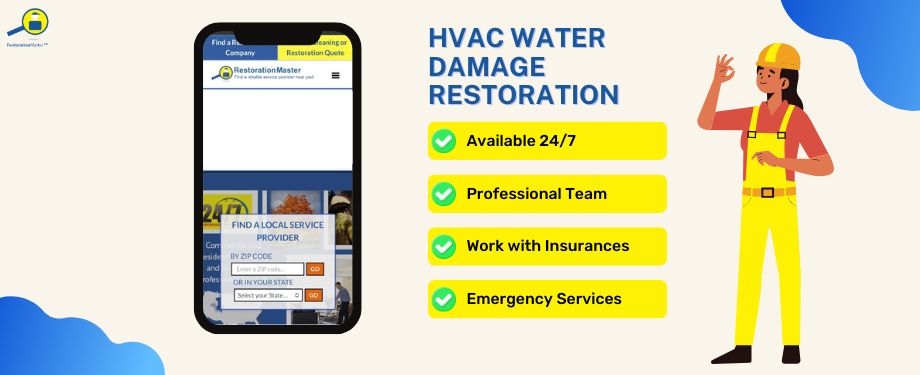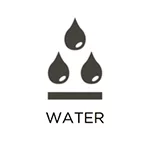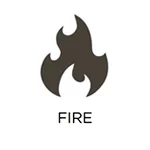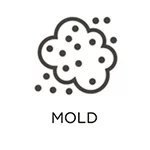HVAC leaks can cause significant water damage, leading to mold growth, structural issues, and poor indoor air quality. Here in Rochester, NH, where hot, humid summers and freezing winters put a lot of stress on heating and cooling systems, it’s not uncommon for homeowners and businesses to experience problems like clogged drain lines, overflowing drip pans, or excessive condensation.
If you’ve noticed water pooling near your unit, damp spots on walls or ceilings, or a musty smell in your home, it’s important to act fast. Even a small leak can turn into a bigger problem if left unchecked. Our team specializes in quick, effective water damage restoration after an HVAC leak. We’re local, experienced, and available 24/7 to help you get your home or business back to normal.

Common Causes of HVAC Water Damage
HVAC leaks can happen for several reasons, including:
- Clogged Condensate Drain Line – Dirt, mold, and algae can block the drain line, causing water to back up and overflow.
- Drain Pan Overflow – A cracked, rusted, or misaligned drip pan can lead to leaks around the unit.
- Frozen Evaporator Coils – Restricted airflow from dirty air filters or low refrigerant levels can cause coils to freeze and thaw, leading to excess moisture.
- Refrigerant Line Condensation – Poor insulation on refrigerant lines can cause excessive condensation, damaging surrounding areas.
- Ductwork Moisture Buildup – Poor ventilation and high humidity levels can lead to condensation inside air ducts, promoting mold growth.
Signs of HVAC Water Damage
Look out for these warning signs of an HVAC-related water issue:
- Water pooling near your HVAC unit
- Damp spots on walls, ceilings, or floors
- Musty or mildew-like odors
- Peeling paint or bubbling drywall
- Increased indoor humidity levels
- Unexplained rise in energy bills
The Risks of Ignoring a HVAC Leak
Neglecting an HVAC water leak can result in severe property damage and health concerns, including:
- Mold & Mildew Growth – Excess moisture creates a perfect breeding ground for mold, leading to respiratory issues and costly remediation.
- Structural Damage – Prolonged water exposure can weaken floors, walls, and ceilings, causing warping, staining, and rot.
- Electrical Hazards – Water leaks near wiring, circuit breakers, or HVAC components increase the risk of short circuits and fire hazards.
- Decreased Indoor Air Quality – Standing water and damp conditions encourage the spread of allergens, bacteria, and mold spores.
Our experts provide fast water damage restoration to mitigate these risks and restore your home or business to pre-loss condition.
Our HVAC Water Damage Restoration Process
We follow a comprehensive approach to ensure effective water damage mitigation and restoration:
Emergency Water Extraction & Drying
- Use of industrial-grade pumps and high-powered fans to remove standing water.
- Advanced dehumidification techniques to eliminate excess moisture.
Mold Prevention & Decontamination
- Antimicrobial treatments to prevent mold growth.
- HEPA air scrubbers to improve air quality.
Structural Drying & Repairs
- Repairing drywall, flooring, and ceilings damaged by water.
- Restoring insulation and ductwork affected by moisture buildup.
HVAC System Inspection & Maintenance
- Cleaning drain lines, coils, and air ducts to prevent future leaks.
- Checking for underlying HVAC issues that could cause repeat damage.
Insurance Claim Assistance
- Documentation of damages for insurance claims.
- Coordination with insurance adjusters to streamline the process.
How to Prevent Future HVAC Water Damage
Routine maintenance is essential to preventing costly water damage from your HVAC system. Here are some effective preventative measures:
- Schedule Regular HVAC Inspections – Have your system checked at least twice a year to catch potential issues early.
- Clean the Condensate Drain Line – Flush the line with vinegar or bleach regularly to prevent clogs.
- Replace Air Filters – Ensure air filters are clean and replaced regularly to maintain proper airflow and prevent frozen coils.
- Install a Drain Pan Overflow Switch – This device automatically shuts off your HVAC system if a leak is detected, preventing further damage.
- Monitor Humidity Levels – Use a dehumidifier to keep indoor humidity levels below 50%, reducing the risk of condensation and moisture buildup.
Contact Us for HVAC Water Damage Cleanup in Rochester, NH
If you’re experiencing water damage due to an HVAC leak, don’t wait! Our experienced restoration specialists are available 24/7 to provide fast, reliable cleanup and repair services in Rochester, NH, and surrounding areas. Call (781) 604-1476.
Recent Reviews
Samantha Hibberd

"I called literally everyone to come out and clean the underneath of our trailer when we had a septic and water line break. No one was willing to do the job and RestorationMaster were the last people I called. It was the easiest transaction and someone was able to come that day to come look at it and they were back within a few days to get the job done. Super grateful!"
Efonthedl

"Couldn’t be happier! The folks over at RestorationMaster are knowledgeable, competent and extremely helpful. From start to finish, they walk you through the process. Explanatory and concise. They ensure the process is seamless and effortless without worry. Thank you to the entire team, especially Christine, Brianna and Roberto for your time, patience and kindness! 5 star all around!"
Michelle Glover

“They responded quickly, were respectful of our home and responsive to our requests. Services: Fire damage cleanup & repair”
Michael Long

“RestorationMaster was helpful and prompt in resolving our water damage and associated cleanup operation. Positive: Responsiveness, Punctuality, Professionalism. Services: Mold inspection, Water damage-related cleanup & repair, Water damage-related mold removal.”
Al T.

“The water supply line to our refrigerator ice-maker burst and leaked water all over the hardwood floor and into the basement. After we got a plumber to shut the water valve which was located behind the built-in refrigerator, RestorationMaster came to do remediation. Marvin and his crew measured the moisture in our walls and floors, removed the baseboards and drilled holes into the wall. They then set up equipment in our kitchen and basement. Marvin came by the next day to check on progress, moved some equipment around and then came back 3 days later to do a final check. Their actions saved our wooden floors! Marvin and his crew were truly awesome - professional, courteous and friendly throughout. Highly recommended. Positive: Responsiveness, Punctuality, Quality, Professionalism, Value. Services: Water damage-related cleanup & repair.”
Migdalia Curet-Wiggins

“Very Professional and quick response”






